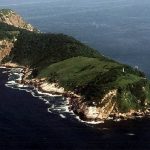The Earth’s Oceans
Oceans make up about ¾ of our planet. They also give life to the planet, they sustain every aspect of existence, and they influence our climate. They are even essential for global trade. Even though our oceans have been here well before us, we still don’t know much about them. In fact, there is 80 percent of the ocean that still remains unexplored. We have no idea what lies at the deepest parts of the ocean; therefore, a project called Deep Search was stated. It is their goal to find out what lies at the bottom of some of the deepest waters. Scientists exploring the waters off South Carolina have made an incredible deep-sea discovery.
Coral Reef
In August 2019, the team from Deep Search made one of the most surprising discoveries while searching 150-miles off the South Carolina shoreline. While exploring the area, scientists found a patch of a coral reef that was practically pristine. If you don’t know what a coral reef is, it is a sub-aquatic ecosystem that is made up of corals, which are marine invertebrates. The reefs emit calcium carbonate, which becomes a solid, tough substance that can support and protect the coral. They are also known as underwater rainforests, and at least ¼ of the marine life in the water depend on them for food or shelter.
Danger
Coral reefs are essential to our oceans, and they are at risk. Coral bleaching is the biggest. This occurs when the ocean temperature rises due to climate change. Excessive fishing and acidification also put the coral reefs at risk. Finally, high levels of nitrogen and sunscreen being deposited in our oceans are dangers for the coral reefs. Over the years, the coral reefs on our planet have been in decline. Because of this, marine life in some areas has completely died out.
The Office Of Ocean Exploration and Research (OER)
This is a group who focuses on sub-aquatic exploration, and they were the team who manned the Deep Search. It is their goal to learn as much as possible about our oceans. In August 2018, the scientists working on the mission left Woods Hole, Massachusetts onboard the Okeanos. They got to see deep within the ocean using a tool called Alvin. It is a submersible that can carry humans to very deep areas. Erik Cordes was one of the team members.
The Reef
It was about 2,500-feet under the water, where they found the unseen reef. It stretched about 85 linear miles, possibly more. Erik says that the reef was incredible due to the amount of Lophelia
Critical Time
The discovery of the reef came at a very critical time because, at the same time, President Trump announced that he would be expanding offshore drilling in the Arctic, Atlantic, and Pacific Oceans. The plan was to put 9/10 of the coastal U.S. waters under federal jurisdiction. Erik and his team knew that this would be a big mistake and harmful for our underwater ecosystem. He knows that this type of drilling can be disastrous.
Further Exploration
Erik and his team have no intention of stopping the study now. It is their goal to study the reefs to find out more about the communities of creatures that are living there. Much of the team’s findings have been posted on YouTube. What the researchers found especially shocking was that large fish, like the swordfish, were swimming by the reef. They were coming down to the area specifically to interact with these habitats. This is unusual behavior.
The Ultimate Goal
Erik says that the ultimate goal of the study is to learn as much about the reefs and inform management agencies. They need these people to understand that human contact in these areas need to be limited if they are going to remain in pristine condition.
Excitement
Erik says that each time they go down deep into the water, there is a feeling of excitement within the researchers. They know that there is more to be discovered and more that we don’t know about the Earth’s oceans.
Saving the Reef
Erik is positive that the planned offshore drilling and human contact will destroy the coral reefs that the sea life depends so significantly on for survival. You can only hope the powers-that-be will listen and stop what they have planned. Greed is one thing; saving our oceans is another.


